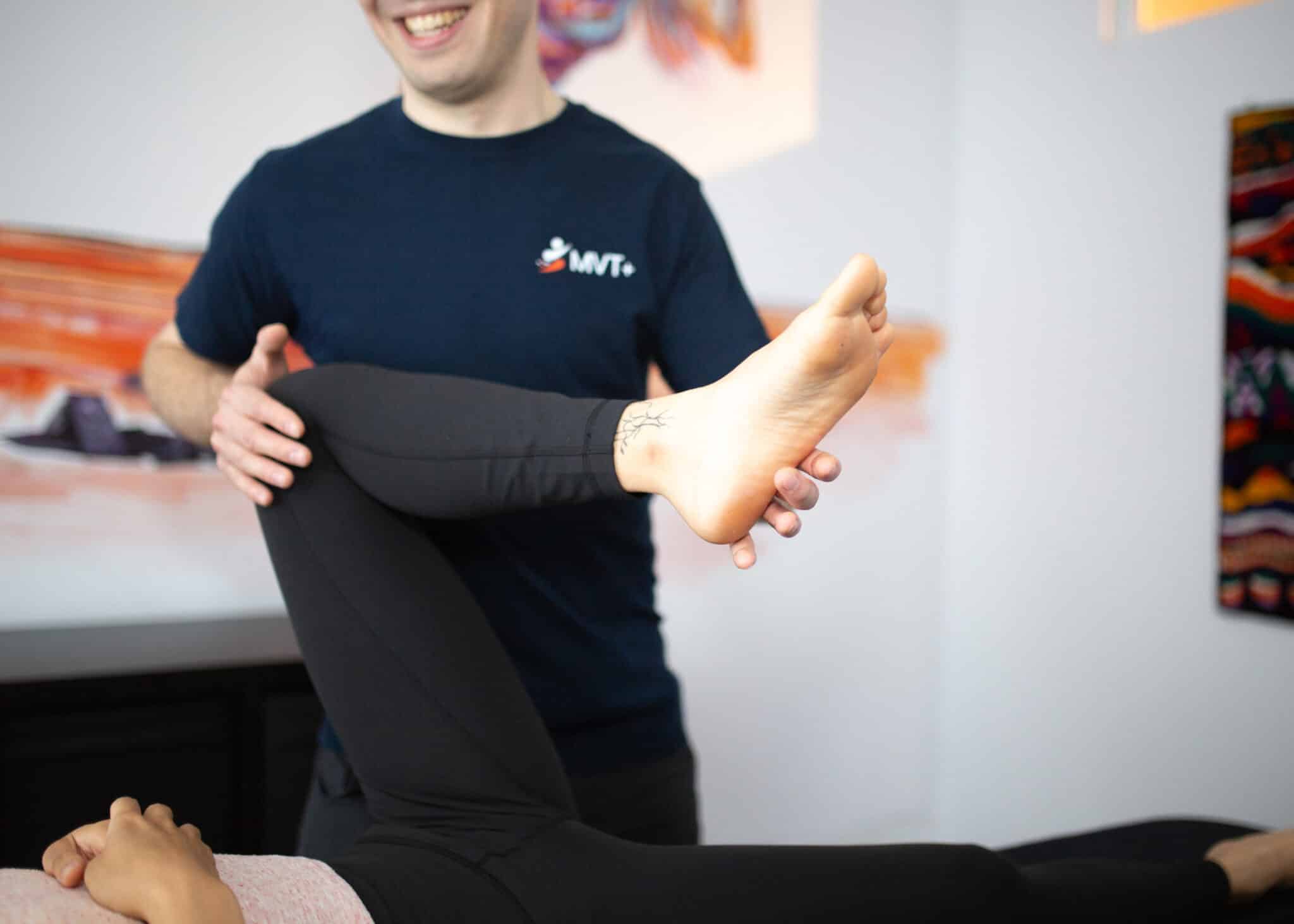Physiotherapy: A Comprehensive Guide to Healing and Recovery
Don't delay ! Book your physiotherapy session now.
Recover quickly from injury and manage your pain with physiotherapy at MVT+ !

Introduction to Physiotherapy
Physiotherapy, often referred to as physical therapy, is a healthcare profession that focuses on the physical rehabilitation and maintenance of individuals across their lifespan. It aims to improve movement, relieve pain, and prevent or manage physical impairments resulting from injury, disease, or disability. With roots that trace back to ancient civilizations, where techniques like massage were used, physiotherapy has evolved significantly, becoming a cornerstone in modern medicine.
Physiotherapy is more than just exercises and massages; it’s a dynamic, evidence-based practice that plays a crucial role in helping patients recover from injuries, surgeries, and chronic conditions. As a non-invasive treatment option, it’s particularly valued for its holistic approach, focusing on the body’s ability to heal itself with proper guidance.
At MVT+, we understand the importance of personalized care in your journey to recovery. Whether you’re dealing with a recent injury or managing a chronic condition, our expert physiotherapists are here to help you regain your mobility and improve your quality of life. Take the first step towards recovery—book your consultation with MVT+ today.
Long-Term Pain Relief and Management
Physiotherapy effectively helps reduce pain without medication by targeting underlying causes for lasting relief.
Increased Mobility and Flexibility
Tailored exercises restore mobility and improve flexibility, making daily movements easier.
Faster Recovery After Injury or Surgery
Physiotherapy promotes a faster and safer recovery, helping regain strength and function after an injury or surgery.
Injury Prevention and Enhanced Physical Performance
By identifying weaknesses, physiotherapists help prevent injuries and improve physical performance for greater efficiency.
Understanding the Role of a Physiotherapist
A physiotherapist is a licensed healthcare professional who specializes in the assessment, diagnosis, and treatment of physical impairments. Their expertise lies in understanding the intricate biomechanics of the human body and how to restore optimal function. Whether you’ve sprained an ankle or are recovering from a stroke, a physiotherapist designs a treatment plan tailored to your specific needs. Regardless of their specialization, the core skills of a physiotherapist include manual therapy, therapeutic exercises, and patient education, all aimed at promoting health and preventing further injury. Our licensed physiotherapists are dedicated to understanding your unique needs. We tailor our treatment plans to ensure you receive the most effective care.

Common Conditions Treated by Physiotherapy
Physiotherapy is incredibly versatile, capable of addressing a wide range of conditions. Some of the most common include:
Musculo-skeletal Disorders
These include back pain, neck pain, joint problems, and muscle injuries. Physiotherapists use techniques like mobilization, strengthening exercises, and ergonomic advice to manage these conditions.
Neurological Conditions
For patients suffering from conditions like stroke, Parkinson’s disease, or multiple sclerosis, physiotherapy is essential in improving motor skills, balance, and coordination.
Sports Injuries
From sprains and strains to ligament injuries, physiotherapy is key in both the prevention and rehabilitation of sports-related injuries.
Post-Surgical Recovery
After surgeries, particularly those involving the musculoskeletal system, physiotherapy is vital in restoring movement, strength, and function.
No matter what condition you’re dealing with, MVT+ is equipped to help you recover and thrive. From managing musculoskeletal disorders to enhancing your sports performance, our comprehensive services are designed with your health in mind.
Types of Physiotherapy Treatments
Physiotherapy employs a diverse range of treatment techniques, each designed to address specific issues:
- Manual Therapy: This involves hands-on techniques like joint manipulation, soft tissue massage, and stretching to relieve pain and improve mobility.
- Exercise Therapy: Tailored exercises are prescribed to strengthen muscles, improve flexibility, and enhance overall physical function. These exercises can range from simple movements to complex, sport-specific drills.
- Electrotherapy: Techniques like ultrasound and transcutaneous electrical nerve stimulation (TENS) are used to reduce pain and stimulate tissue healing.
- Heat and Cold Therapy: These are used to manage pain and inflammation. Heat therapy relaxes muscles and improves blood flow, while cold therapy helps in reducing swelling.

Benefits of Physiotherapy
The benefits of physiotherapy are extensive and can be life-changing. Here are a few key advantages:
- Pain Management: Physiotherapy is highly effective in managing chronic pain, often reducing the need for long-term medication use.
- Improved Mobility and Function: By addressing the root cause of movement restrictions, physiotherapy helps patients regain their independence and improve their quality of life.
- Prevention of Injury and Complications: Physiotherapists provide education on proper movement techniques and ergonomics, helping to prevent future injuries.
- Enhanced Physical Fitness: Through tailored exercise programs, physiotherapy helps in improving strength, flexibility, and cardiovascular health.
Experience the life-changing benefits of physiotherapy with MVT+. Our evidence-based practices are designed to not only relieve pain but also improve your overall physical function and prevent future injuries. Don’t wait—book your appointment at MVT+ and start feeling better now.
Physiotherapy in Sports
In the world of sports, physiotherapy is indispensable. Athletes rely on physiotherapists not only to recover from injuries but also to enhance their performance. Here’s how physiotherapy plays a role in sports:
- Injury Prevention: Physiotherapists assess an athlete’s movement patterns to identify potential risks and provide exercises to strengthen weak areas, thus reducing the likelihood of injury.
- Rehabilitation Post-Injury: A physiotherapist guides the athlete through the recovery process, from regaining basic movement to returning to full sports participation.
- Performance Enhancement: By improving flexibility, strength, and endurance, physiotherapy helps athletes achieve their peak performance.
Athletes trust MVT+ to help them recover from injuries and reach their peak performance. Whether you’re recovering from a recent injury or looking to enhance your athletic abilities, schedule your session with MVT+ today and take your performance to the next level.
Physiotherapy for Chronic Conditions
Chronic conditions often require ongoing management, and physiotherapy is an integral part of this process:
- Managing Arthritis with Physiotherapy: Physiotherapists help arthritis patients maintain joint function and reduce pain through specific exercises and treatments.
- Chronic Pain Management: Techniques such as manual therapy and TENS can help manage chronic pain conditions, providing patients with much-needed relief.

Physiotherapy vs. Other Forms of Therapy
It’s important to understand how physiotherapy differs from other forms of therapy:
- Differences between Physiotherapy and Chiropractic Care: While both focus on musculoskeletal health, chiropractors primarily focus on spinal adjustments, whereas physiotherapists use a broader range of techniques.
- Physiotherapy vs. Occupational Therapy: Occupational therapy focuses on helping patients perform daily activities, while physiotherapy focuses on improving physical movement and function.
- Integrating Physiotherapy with Other Treatments: Physiotherapy often complements other treatments, such as surgery or medication. Additionally, the multidisciplinary approach in massage therapy and osteopathy provides comprehensive and holistic care.

How to Choose the Right Physiotherapist
Choosing the right physiotherapist is crucial for effective treatment:
- Qualifications and Experience: Look for a physiotherapist with the necessary qualifications and a proven track record in treating your specific condition.
- Specialized Expertise: If you have a particular injury or ailment, seeking a physiotherapist with specialized knowledge in that area can be beneficial.
- Treatment Approach: Ensure the therapist’s treatment philosophy aligns with your preferences and goals.
- Communication and Rapport: A strong patient-therapist relationship is crucial. Choose someone you feel comfortable with and who listens attentively to your concerns.
At MVT+, our team of experienced physiotherapists is dedicated to helping you achieve your optimal health and well-being. We combine the latest evidence-based practices with personalized care to create tailored treatment plans for each individual. Our open and collaborative approach ensures you feel supported and empowered throughout your recovery process.
Ready to take the next step? Book an appointment today and discover how our physiotherapy services can benefit you.
Conclusion
Physiotherapy is a vital component of modern healthcare, offering a non-invasive, personalized approach to healing and recovery. Whether you’re dealing with an injury, managing a chronic condition, or looking to enhance your physical fitness, physiotherapy can help you achieve your goals. As the field continues to evolve, incorporating new technologies and techniques, its role in healthcare will only become more prominent.
Physiotherapy with MVT+ is your pathway to better health. Take control of your recovery—book an appointment with us today and discover how we can help you achieve your goals.
FAQ
What is the difference between a physiotherapist and a chiropractor?
While both focus on musculoskeletal health, chiropractors primarily perform spinal adjustments, whereas physiotherapists use a broader range of techniques, including exercises, manual therapy, and electrotherapy.
How long does a typical physiotherapy session last?
Your initial physiotherapy assessment is one hour. Follow-up sessions are typically 30-60 minutes.
Can physiotherapy help with chronic pain?
Yes, physiotherapy is highly effective in managing chronic pain through various techniques, including exercise therapy, manual therapy, and electrotherapy.
Is physiotherapy suitable for everyone?
Physiotherapy is suitable for people of all ages and physical conditions, from children to the elderly, and can be adapted to meet individual needs.
How do I know if I need physiotherapy?
If you’re experiencing pain, limited mobility, or recovering from an injury or surgery, it’s a good idea to consult a physiotherapist who can assess your condition and recommend treatment.
